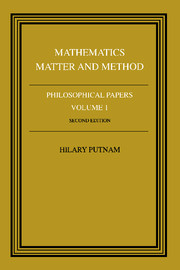Book contents
- Frontmatter
- Contents
- Dedication
- Introduction
- 1 Truth and necessity in mathematics
- 2 The thesis that mathematics is logic
- 3 Mathematics without foundations
- 4 What is mathematical truth?
- 5 Philosophy of physics
- 6 An examination of Grünbaum's philosophy of geometry
- 7 A philosopher looks at quantum mechanics
- 8 Discussion: comments on comments on comments: a reply to Margenau and Wigner
- 9 Three-valued logic
- 10 The logic of quantum mechanics
- 11 Time and physical geometry
- 12 Memo on ‘conventionalism’
- 13 What theories are not
- 14 Craig's theorem
- 15 It ain't necessarily so
- 16 The ‘corroboration’ of theories
- 17 ‘Degree of confirmation’ and inductive logic
- 18 Probability and confirmation
- 19 On properties
- 20 Philosophy of Logic
- Bibliography
- Index
12 - Memo on ‘conventionalism’
Published online by Cambridge University Press: 04 August 2010
- Frontmatter
- Contents
- Dedication
- Introduction
- 1 Truth and necessity in mathematics
- 2 The thesis that mathematics is logic
- 3 Mathematics without foundations
- 4 What is mathematical truth?
- 5 Philosophy of physics
- 6 An examination of Grünbaum's philosophy of geometry
- 7 A philosopher looks at quantum mechanics
- 8 Discussion: comments on comments on comments: a reply to Margenau and Wigner
- 9 Three-valued logic
- 10 The logic of quantum mechanics
- 11 Time and physical geometry
- 12 Memo on ‘conventionalism’
- 13 What theories are not
- 14 Craig's theorem
- 15 It ain't necessarily so
- 16 The ‘corroboration’ of theories
- 17 ‘Degree of confirmation’ and inductive logic
- 18 Probability and confirmation
- 19 On properties
- 20 Philosophy of Logic
- Bibliography
- Index
Summary
(1) Grünbaum's last memorandum in defense of ‘conventionalism’ with respect to geometry seemed to me to mark a definite shift in his position since our Princeton conference. I hope that this shift was conscious and intentional, and that ‘polemical’ considerations will not lead Grünbaum to repudiate this ‘shift’ if I point it out!
The shift I have in mind is this: at the Princeton conference Grünbaum emphasized that his ‘conventionalism’ is a logical (or perhaps metaphysical?) thesis, but certainly not an empirical one. I specifically put to him the following question, which I regard as of central importance for this area: what he would say if the world were ‘Newtonian’ (e.g. the Michelson-Morley experiment had the ‘other’ result, the velocity of light relative to the ‘ether’ were measurable, etc.); and he replied that his position would be unchanged. That is, in a Newtonian world, even one in which the notion of ‘absolute velocity’ has obvious physical meaning, length is still not an intrinsic (Grünbaum's word, not mine!) property of physical objects, and simultaneity is still not an intrinsic relation between physical events. The choice of a metric is still a matter of convention; although (in such a world) one conventionf is immensely superior to all rivals, from a practical standpoint. (This was Reichenbach's standpoint in his Space-Time book as I pointed out; and it is precisely this notion of a ‘convention’ which cannot be told from a bona-fide physical law‡ that I find so puzzling.) Now, however, it appears that the strongest arguments for conventionalism are from its alleged empirical import; and this empirical import of ‘conventionalism’ is linked by Grünbaum to the special theory of relativity.
- Type
- Chapter
- Information
- Mathematics, Matter and MethodPhilosophical Papers, pp. 206 - 214Publisher: Cambridge University PressPrint publication year: 1979
- 2
- Cited by



